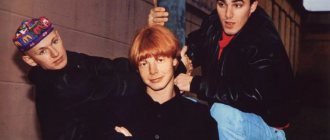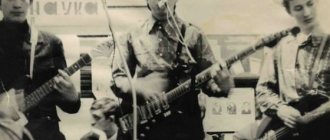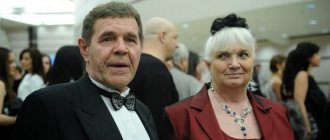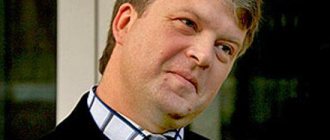This term has other meanings, see Earring (meanings).
| Earring | |
| basic information | |
| Genre | Rock, blues rock, hard rock |
| Years | from 1994 to present |
| A country | Russia, Russia |
| City | Moscow |
| Language of songs | Russian |
| Compound | Sergey Galanin (since 1994) Andrey Kifiyak (since 2003) Sergey Polyakov (since 2007) Sergey Krynsky (since 2007) Sergey Levitin (1994-2003 and since 2014) |
| [www.serga.ru/ga.ru] | |
EarringEarring
“Earring”
is a Russian rock band formed in 1994 by Sergei Galanin. The group's motto is “For those who have ears.”
Story
| This section is not completed. You will help the project by correcting and expanding it. |
Before SerGi, Galanin managed to play in the VIA Rare Bird and the Gulliver group. Together with Garik Sukachev he created the group “Brigade S”. Due to disagreements, he left Brigade S, creating the group “Brigadiers”. The project was not very successful and Galanin returned to Brigade S. But in 1993 he left completely and began solo work.
In 1994, Sergei Galanin recorded the solo album “Dog Waltz”, which included such famous songs as “What do we need”
and
good night"
. The musicians who helped record the album soon united as part of the new group “SerGa”[1]. In the same year, the group gave its first concert in Rostov-on-Don on the same stage with the groups “Alice” and “Chaif”.
Wonderland: 10 main songs of the group “SerGa”
The future leader of SerGi studied at the Moscow Institute of Transport Engineers at the Faculty of Bridges and Tunnels, and after graduation he worked in the central laboratory of Metrostroy and supervised the construction of the Dobryninskaya and Prazhskaya stations. At the same time as MIIT, Galanin managed to graduate from the Lipetsk Regional Cultural and Educational School with a course in orchestral conducting. At the school, Sergei met Garik Sukachev: by the beginning of 1986, the group “Brigade S” , where Galanin played bass guitar.
However, as often happens, contradictions began to grow between the two creative personalities, and Galanin left the Brigade. After some time, Sergei returned to Sukachev’s team, but in 1994 the group broke up. In June of the same year, Galanin created his own group “SerGa” . The first concert took place in Rostov-on-Don, followed by numerous performances at rock festivals.
Galanin combines concerts and song recordings with work on television: from 2001 to 2004, Sergei hosted a program on drug addiction “Coma” on NTV, and in 2013 he participated in the First Channel project “Universal Artist”.
“Evening Moscow” brings to your attention a selection of the most striking compositions of Galanin’s main brainchild, the group “SerGa”.
1. Good night (from the album “Dog Waltz”, 1994)
The title song from the first album “SerGi” is a kind of “software work” of the group. Here we sing about the feeling of freedom - a theme that runs through all of Galanin’s main compositions. To be happy, you essentially need so little - to walk with your loved one at night along “dark streets that call you into yourself,” to breathe in your favorite city and, as a result, to feel free.
2. Warm air from the roofs (from the album “Dog Waltz”, 1994)
It is no coincidence that Galanin sings that “warm air from the roofs rises in the evening.” The iron roofs of city houses cool down in the evening, after a hot day, and the warm air rising from them also symbolizes human cleansing. The hero of the song encourages everyone to do something good - to give others at least a little love and warmth.
3. What do we need (from the album “Dog Waltz”, 1994)
This song is dedicated to simple human happiness, for which, it would seem, you need nothing at all: light in the window of your home and the absence of war. But figuring out where “evil is roaming” is very difficult; the hero of the song goes “to where the sun shines,” but he must get there “before it gets dark,” and this is not so easy...
4. Road into the night (from the album “Road into the night”, 1997)
The second title of “Roads into the Night” is “In Memory of a Friend.” The hero of the song is apparently a recently deceased man who talks to the night while in the other world. The final line (“There are exactly as many stars in the sky as there are our eyes”) conveys the idea that each star in the sky is destined for a certain person who, sooner or later, will have to follow this road.
5. I see the sun (from the album “Road into Night”, 1997)
An old hit that has stood the test of time, given new life thanks to a re-recording with the participation of Vyacheslav Butusov and Yuri Kasparyan . The hero of the song moves away from the bustle of the city “to the cries of birds and the laughter of children” and hurries “towards the great river.” All he needs is to talk to the river in which the sun is reflected and feel inner freedom.
6. Wonderland (from the album “Wonderland”, 1999)
A pacifist manifesto about how a group of people persistently search for a wonderland, persistently wandering “through the mountains, through the forest.” On the way, two steps away, they encounter war, human suffering, grief and tears. However, silence wins the war, and the heroes of the song themselves eventually find a wonderland. And this is quite logical, because they are constantly accompanied by a feeling of freedom:
The sun and the moon are with us, the sound of rain and silence, Mother Earth is under our feet, songs by the fire at night, Everyone is laughing, those are the cross, where are you, wonderland. A drunken wind in the clouds, road dust on your boots, Either joy or fear, the honey of freedom on your lips.
7. Love (from the album “I’m like everyone else,” 2003)
Duet with Konstantin Kinchev . The composition is built on a dialogue with the listener. Everyone who listens to the song must answer the questions asked in it for themselves.
Do you remember love? Do you know how to drop this word in the sand?
You must not only believe in love, you must look for the feeling if it is not there, and in addition, you must constantly remember about it.
8. You don’t need anyone (from the album “I’m like everyone else,” 2003)
In this song about a midlife crisis, Galanin demonstrates an excellent sense of humor, very wittily talking about a difficult period in a man’s life:
When in your apartment the phone is silent like a fish, When the red-haired neighbor doesn’t want to visit, A lonely man has a promising choice, If you like, you’ll disappear from boredom, or you’ll turn green with anger.
True, the consequence of all this fun is alcoholism and apathy. And the extreme degree of decline is when no one needs you and no one needs you.
9. The cold sea is silent (from the album “Normal Man”, 2006)
The song is heard in the film “First After God ,” based on the biography of the famous Soviet submariner Alexander Marinesko. The hero of the song also serves on a submarine, and every time he goes to sea, he is tormented by anxiety for himself and for the woman he loves, and longing for land. Every time the hero experiences uncertainty (after all, he does not know whether he will return home or not), he wants the sea to whisper three words: “We will live.” But the cold sea is silent...
10. Valera, where are you? (from the album “Nature, Freedom and Love”, 2011)
Galanin was inspired to write this song, beloved by all rock festival regulars, from his search for the mythical character Valera, who became a “meme” of the “Empty Hills 2010” festival. The point was that people were wandering around the festival field and shouting: “Valera!!!”, “Valera, where are you???”, and pestered others with the question: “Have you seen Valera?”
At the same time, no one knows Valera himself, no one even knows what to do if he is found. The story with Valera continued in the same 2010 at the “Invasion” festival, when the desired character appeared on posters, flags and signs. So since then everyone has been looking for this mysterious Valera.
Discography
| Name | Participants | Year of issue |
| Dog Waltz | Galanin/Ayupov/Yartsev/Pavlenko/Ermolin/Likhachev/Romanova | 1994 |
| Earring | Galanin/Levitin/Molodtsov/Mechl/Ayupov/Trifanova | 1995 |
| Valley of the Eyes | Galanin/Levitin/Molodtsov/Balakirev/Ayupov/Trifanova | 1997 |
| Road into the night | Galanin/Levitin/Molodtsov/Balakirev/Trifanova | 1997 |
| Living collection | Galanin/Levitin/Prokushenkov/Balakirev | 1998 |
| Wonderland | Galanin/Levitin/Prokushenkov/Balakirev | 1999 |
| Best songs | Galanin/Levitin/Prokushenkov/Balakirev | 2001 |
| I'm like everyone else | Galanin/Levitin/Prokushenkov/Balakirev | 2003 |
| Night road to wonderland | Galanin/Levitin/Prokushenkov/Balakirev | 2005 |
| Normal person | Galanin/Kifiyak/Prokushenkov/Balakirev | 2006 |
| Children's heart | Galanin/Kifiyak/Krynsky/Polyakov | 2011 |
| Nature, freedom and love | Galanin/Kifiyak/Krynsky/Polyakov | 2011 |
| Purity | Galanin/Kifiyak/Krynsky/Polyakov | 2015 |
History[edit | edit code]
| This section is not completed. You will help the project by correcting and expanding it. |
Before SerGi, Galanin managed to play in the VIA Rare Bird and the Gulliver group. Together with Garik Sukachev he created the group “Brigade S”. Due to disagreements, he left Brigade S, creating the group “Brigadiers”. The project was not very successful, and Galanin returned to Brigade S. But in 1993 he left completely and began solo work.
In 1994, Sergei Galanin recorded his first solo album, “Dog Waltz,” which included such famous songs as “What Do We Need”
and
good night"
. The musicians who helped record the album soon united as part of the new group “SerGa”[1]. In the same year, the group gave its first concert in Rostov-on-Don on the same stage with the groups “Alice” and “Chaif”.
In 1995, “SerGa” goes “as an opening act” on the anniversary tour of the group “Chaif”, releases the album of the same name “SerGa”, often appears on TV, and plays a lot on the radio.
In 1997, the album “Road into the Night” appeared with a piercingly deep title song, which is still included in Sergei’s “golden” hit list.
The crisis of 1998 forced the release of new material to be postponed; in 1999, the album “Wonderland” was released. Again, the title number quickly storms various charts and hit parades.
After some decline in activity at the turn of the 2000s, in 2003 Sergei actively declared himself with the solo album “I’m like everyone else.” Galanin's best old and several new songs were performed in duets with friends, rock colleagues: A. Makarevich, E. Margulis, A.F. Sklyar, Agatha Christie, Chizh, V. Kipelov and many others. The radio station editors like the project, the songs are heard on the air again, and the group is experiencing a new round of popularity. The album includes the composition “We are the children of the big city,” which became the last work in the music of Sergei Krutikov (“Micah”).
In 2006, the group's numbered album "Normal Man" was released, the song from which - "The Cold Sea is Silent" - is included in the soundtrack of the film about submarine heroes "First After God".
Since 2008, the group has been recording new material in the studio again, which is immediately actively performed at concerts. In addition to his own program, Sergei and his colleagues actively participate in various musical special projects. In particular, the performance of “SerGi” is on the tribute bands “Secret”, “Picnic”, a joint song (“I’m going, I’m going”) was recorded for the anniversary of the group “Chizh and Co”, the anthem of the Moscow football club “Torpedo” - “You are black and white” “,” the title song of the ice sports show is “Who’s Next to You.”
In 2009-2010, the group took part in the projects “Typewriting” (a tribute to the “Time Machine”), “Songs for Alla” (a tribute to A.B. Pugacheva) and “Salt” (folk songs on “Our Radio”). At the end of 2009, the group starred in Klim Shipenko’s new feature film “1000 kilometers from my life” (premiere at Kinotavr 2010 in Sochi). The result of participation in the film was a video for the new song “Angel”, which uses footage from the film.
On November 25, 2011, at one of the best concert venues in Moscow, Crocus City Hall, a celebration of Sergei’s 50th birthday took place, which became a notable event in the cultural life of Moscow. In the 3-hour anniversary show, along with “SerGa” and the Globalis symphony orchestra, friends-musicians/actors took part: G. Sukachev, “Chaif”, “Resurrection”, A. Kutikov, E. Margulis, V. Samoilov , A.F. Sklyar, “Underwood”, Vasya Oblomov, I. Okhlobystin, M. Gorevoy, and Mikhail Efremov performed as a sparkling Rock entertainer. A special duet musical number was performed with each of the guests. At the concert, two new numbered records of the group were presented - “Children’s Heart” and “Nature, Freedom and Love”, which included 25 new songs, which had been in the works for about five years. A video was shot for the title track “Children’s Heart”, where the roles of clowns were played by Garik Sukachev, Ivan Okhlobystin, Mikhail Efremov and Sergei Galanin himself, and the children themselves were played by the children of the filming participants.
In the summer of 2012, a video was created for the song “You Left Again,” directed by Maxim Vasilenko and Artem Fedotov, and played by Andrey Merzlikin and Alexander Robak.
In 2013, Channel One invites Sergei to become a participant in the new music show “Universal Artist,” where participants compete with each other and embody themselves in a variety of musical genres. Sergei successfully coped with this difficult task, and only in the finals lost the lead to the lady, People's Artist of Russia Larisa Dolina.
In the winter of 2014, the group celebrated its 20th anniversary with large concerts.
In May 2020, the album “Purity” was released. This time, a record number of new songs were broadcast on the radio, four videos were shot in support of the album, one of which, “The Door is Locked” (a duet with the singer Utah), featured friends of the group - famous actors, musicians, writers - so many “stars” it would have been almost impossible to collect in one place and at one time, however, the result exceeded all expectations and the clip became one of the favorites among the group’s audience. The landmark song was the composition “Round Dance”, which reached first place in the chart of “Our Radio” - “Chart’s Dozen”. The video with the participation of Daria Ekamasova, Vasily Mishchenko and Alexander Marin was filmed within the walls of the old building of the Sovremennik Theater, on the famous stage, almost a few days before the theater was closed for global reconstruction. The interiors captured on film will soon become history... In 2016, “SerGa” begins the “Cleanliness” tour and will travel throughout the year to different cities in Russia and the countries of the former Soviet Union.
Covers
| Name | Song | Participants | Year of issue |
| Tribute (Picnic) | The world is having a wonderful dream... | Galanin/Levitin/Prokushenkov/Balakirev | 2003 |
| Odd Warrior (BI-2) | Some sun | Galanin/Kifiyak/Prokushenkov/Balakirev | 2005 |
| Chizh & Co | I'm going, I'm going (with Evgeniy Margulis) | Galanin/Kifiyak/Krynsky/Polyakov | 2008 |
| Typescript (Time Machine) | Hymn to the fence (with Garik Sukachev) | Galanin/Kifiyak/Krynsky/Polyakov | 2009 |
| Salt (Nashe Radio) | My joy lives in a high chamber | Galanin/Kifiyak/Krynsky/Polyakov | 2010 |
| Odd Warrior 3 (BI-2) | Hallelujah (with Nastya Polevaya) | Galanin/Kifiyak/Krynsky/Polyakov | 2013 |
Excerpt characterizing Earring
“This is life,” said the old teacher. “How simple and clear this is,” thought Pierre. “How could I not know this before?” “There is God in the middle, and every drop strives to expand in order to reflect him in the greatest possible size. And it grows, merges, and shrinks, and is destroyed on the surface, goes into the depths and floats up again. Here he is, Karataev, overflowing and disappearing. “Vous avez compris, mon enfant, [You understand.],” said the teacher. “Vous avez compris, sacre nom, [You understand, damn you.],” a voice shouted, and Pierre woke up. He rose and sat down. A Frenchman, who had just pushed aside a Russian soldier, sat squatting by the fire and was frying meat that had been put on a ramrod. Veiny, rolled-up, hairy, red hands with short fingers deftly turned the ramrod. A brown gloomy face with frowning eyebrows was clearly visible in the light of the coals. “Ca lui est bien egal,” he grumbled, quickly turning to the soldier standing behind him. -...brigand. Va! [He doesn’t care... a robber, really!] And the soldier, twirling the ramrod, looked gloomily at Pierre. Pierre turned away, peering into the shadows. One Russian soldier, a prisoner, the one who had been pushed away by the Frenchman, sat by the fire and ruffled something with his hand. Looking closer, Pierre recognized a purple dog, which, wagging its tail, was sitting next to the soldier. - Oh, did you come? - said Pierre. “Ah, Pla...” he began and didn’t finish. In his imagination, suddenly, at the same time, connecting with each other, a memory arose of the look with which Plato looked at him, sitting under a tree, of the shot heard in that place, of the howl of a dog, of the criminal faces of two Frenchmen who ran past him, of the filmed a smoking gun, about the absence of Karataev at this halt, and he was ready to understand that Karataev was killed, but at the same moment in his soul, coming from God knows where, a memory arose of the evening he spent with the beautiful Polish woman, in the summer, on the balcony of his Kyiv house. And yet, without connecting the memories of this day and without drawing a conclusion about them, Pierre closed his eyes, and the picture of summer nature mixed with the memory of swimming, of a liquid oscillating ball, and he sank somewhere into the water, so that the water converged above his head. Before sunrise, he was awakened by loud, frequent shots and screams. The French ran past Pierre. - Les cosaques! [Cossacks!] - one of them shouted, and a minute later a crowd of Russian faces surrounded Pierre. For a long time Pierre could not understand what was happening to him. From all sides he heard the cries of joy of his comrades. - Brothers! My dears, my dears! - the old soldiers cried, crying, hugging the Cossacks and hussars. Hussars and Cossacks surrounded the prisoners and hurriedly offered them dresses, boots, and bread. Pierre sobbed, sitting among them, and could not utter a word; he hugged the first soldier who approached him and, crying, kissed him. Dolokhov stood at the gate of a ruined house, letting a crowd of disarmed French pass by. The French, excited by everything that had happened, spoke loudly among themselves; but when they passed by Dolokhov, who was lightly whipping his boots with his whip and looking at them with his cold, glassy gaze, promising nothing good, their conversation fell silent. On the other side stood the Cossack Dolokhov and counted the prisoners, marking hundreds with a chalk line on the gate. - How many? – Dolokhov asked the Cossack who was counting the prisoners. “For the second hundred,” answered the Cossack. “Filez, filez, [Come in, come in.],” Dolokhov said, having learned this expression from the French, and, meeting the eyes of passing prisoners, his gaze flashed with a cruel brilliance. Denisov, with a gloomy face, having taken off his hat, walked behind the Cossacks, who were carrying the body of Petya Rostov to a hole dug in the garden. From October 28, when frosts began, the flight of the French only took on a more tragic character: people freezing and roasting to death at the fires and continuing to ride in fur coats and carriages with the looted goods of the emperor, kings and dukes; but in essence, the process of flight and disintegration of the French army has not changed at all since the speech from Moscow. From Moscow to Vyazma, out of the seventy-three thousand strong French army, not counting the guards (which throughout the war did nothing but plunder), out of seventy-three thousand, thirty-six thousand remained (of this number, no more than five thousand died in battles). Here is the first term of the progression, which mathematically correctly determines the subsequent ones. The French army in the same proportion melted and was destroyed from Moscow to Vyazma, from Vyazma to Smolensk, from Smolensk to Berezina, from Berezina to Vilna, regardless of the greater or lesser degree of cold, persecution, blocking the path and all other conditions taken separately. After Vyazma, the French troops, instead of three columns, huddled together in one heap and continued like this until the end. Berthier wrote to his sovereign (it is known how far from the truth the commanders allow themselves to describe the situation of the army). He wrote:
Sergei Galanin, “SerGa”: “If we cannot talk with enemies, we are monkeys”
Before starting a conversation with Sergei Galanin, I asked my colleagues: was he really so popular before? And the editors unanimously nodded their heads. Then a dispute began about whether he was cooler in Garik Sukachev’s team or whether his big story began in his own group “SerGa”. Someone even decided to go to tomorrow's concert at Ben Hall.
- I’ll admit right away. I have only known your work for two days. How can I explain to my student friends who Sergei Galanin is? - You don’t even have to explain. Just go to YouTube and watch our videos. I have a special relationship with cinema, a dead art. There are thoughts there, but it’s difficult to express them through a picture. To really feel us, it’s better to watch a concert recording. And one more thing, I have a request to young people. Guys, listen not only to our music on the radio. The more recent songs have ideas for everyone.
— Only old acquaintances come to your concert? Schoolchildren and students are not visible? — It’s a strange thing, but yesterday we played in Izhevsk, and boys and girls of about eleven stood in front of the stage. Of course, they came with their parents. But what’s interesting here is that they weren’t scared of us, which means we’re not scary rockers. Yesterday there were more young people than those who have been in the subject for a long time. I'm not complaining. If young people listen to the right music, then everything is fine.
— Each rock musician has his own image on stage. Shnur is a spectacular freak, Kinchev is an Orthodox holy fool, Chaifa are his guys, Garik wants women to be afraid of him, and men to smoke nervously at the sight of him. Where is the SerGa group here? — The first word is “hairy.” Nowadays, most rockers are already bald. There's nothing you can do - the years are taking their toll. I promise that I won’t be upset if my hair starts to leave me. It's OK. Bald is beautiful and suits many people.
— By the way, would you, like ZZ Top, refuse to shave off your hair for a lot of money? - Find me such a philanthropist, we will discuss this topic. (Laughs - editor's note) And if you think further, then to “hairy” you can add “doing his job.” If it wasn't necessary, I would quit. It sounds pretentious, I understand.
“Didn’t you want to make a scandal?” To promote yourself? - This is the fate of pop stars. They constantly think about new scandals in the spirit of “he met her, she is twenty years older, but despite everything...”. Their fans like things like this, what can you do? I do my job modestly and remain myself. But such thoughts are unnatural for rockers.
— You can make a loud political statement and be at the top of music news. For example, what happened with Makarevich’s concerts. - You are wrong here. Andrei Vadimovich does not need glorification. His situation is connected with the tragic situation in Ukraine. He has his own cockroaches and his own vision of the world.
—Where do you think our country is heading? — Everything is very difficult, ambiguous. Russia has been given a chance to be reborn. Foreign policy today is worthy of respect; it should properly reflect the civic love for the Motherland.
— Hasn’t this happened before? — In the nineties, we forgot about everything, we were euphoric. Now we only think about what is happening outside. We must not forget about the rust that eats us away from the inside. Nobody canceled officials, corrupt cops.
- Is everything that bad? “I believe we can cleanse ourselves.” I don’t give up on anyone. Yesterday a person was dishonest, but today he realized that this was wrong and changed. I have a little hope that we will begin to change ourselves. It is difficult to change a good friend, but it is more difficult to change a friend. An outsider is almost impossible. But you can always change yourself, you need to work on yourself.
— Don’t you have the feeling that everyone has turned their backs on Russia and we are alone? — Your question reeks of chauvinism. It amuses me when they say the word “everyone.” Or the cooler phrase “civilized world.” What does "civilized world" mean? These are only 30 Anglo-Saxon countries. That's all. There are about two hundred states in the world. And the rest are second grade, or what? Be specific. Yes, there are problems with the European Union and America. But Russia has always had these problems. It cannot be said that everyone turned away. There are many people on this earth whom they do not want to reckon with and whom they want to use.
- What should we do about this? - You always need to talk. Even with enemies. This is the most important condition. What's happening in Ukraine now? How can you destroy your inhabitants? It's hopeless. If we can't talk, we're monkeys. I have many friends with different opinions, we are always ready to discuss and share. Military power is the final argument. Diplomacy exists to grasp at straws. And it doesn’t take much intelligence to start shooting at each other.
— My peers know you from your duet with Mikhei “We are the children of BG.” Which famous person would you sing with now? - In fact, there is no such desire now. You see, this is done when something has accumulated in you. And this becomes a fact in the biography. Neither Mikhei nor I understood then that everything would happen six months after the recording, unfortunately (in June 2002, Mikhei suffered a stroke - editor's note). When you started this question, I thought you were talking about the song “What do we need.” And you're talking about another one. I'm very happy about this. You know her, right?
- Certainly. Only light in the window. - It turns out that there are two songs. (Laughs - editor's note). Well, and you say, only two days ago. I do not believe.
— Aren’t you offended by the fact that rockers used to fill stadiums, but now they play in clubs and pubs? - There is beauty in everything. Thank God, we also have stadiums from time to time. What's bad about pubs? After all, the listener is important. And it doesn’t matter - fifty people, five hundred or five thousand. This doesn't change things. During any concert you have to be good.
— So there is a light sadness for the old days? - Life in general is a bright sadness. She is a strange thing, very difficult to understand. So you woke up in the morning, you are healthy, you have a favorite thing - you are happy by and large. How many people on the planet do not have this? Therefore, when you play in a pub for two hundred people, it’s a great happiness that these two hundred need you.
- What will happen next? - No one knows. The human perspective is not about increasing economic power. Do you know how many great artists died in poverty? And they learned about them only after death. Thinking about well-being is a stupid thing. The meaning of life is to improve yourself.
“Putin also thought so a few years ago. But now I’ve changed my mind. He says that the meaning of life is love. - It depends on what you mean by love. If you are honest in love, then everything else goes in the right direction. Good deeds are both love and the right attitude towards yourself and the world. Still, goodness is more than love.
On Sunday, November 23, Galanin and “SerGa” will come to Yekaterinburg to play a concert as part of the anniversary tour.
Twenty years of creativity will be celebrated at the Ben Hall club at eight in the evening. Details here. Photo: official website of the group “SerGa” https://serga.ru/










